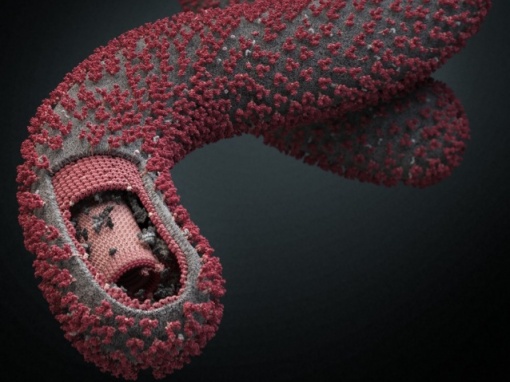Facts and figures
- The Ebola virus in humans causes the eponymous disease (formerly known as Ebola).
- Disease outbreaks of Ebola virus (EVE) have a fatality rate can reach 90%.
- EVE outbreaks occur mainly in remote villages in central and western Africa, near the rain forest.
- The virus is transmitted to humans by wild animals and spread in human populations for transmission from person to person.
- It is considered that the natural hosts of the virus are fruit bats of the Pteropodidae family.
- No specific treatment or vaccine for people and animals.
How is it transmitted?
virus is spread by person-to-person by direct contact of mucous membranes (skin covering the nose, mouth and genitals) or an injury to the skin with blood or other body fluids ( feces, urine, saliva, semen) of infected people with symptoms.

Infection can also occur if the broken skin or mucous membranes of a healthy person comes in contact with dirty clothes, bedding or used needles contaminated with fluids from a patient with Ebola.
Men who have recovered from the disease can still spread the virus through the semen up to 7 weeks after recovery. For this reason, it is important to avoid sexual intercourse or condom use for at least 7 weeks after recovery.
In addition, the disease can be transmitted by contact with body fluids of infected animals (monkeys).
What are the symptoms?
Symptoms of this disease include fever (greater than 38 °), muscle pain, headache and sore throat and weakness.Then they may have vomiting, diarrhea, rash, renal failure and liver and massive internal and external bleeding.
The incubation period (ranging from infection to the onset of symptoms) ranges from 2 to 21 days. Infected patients from the moment they begin to manifest symptoms, not during the incubation period.
How can it be prevented?
There is no vaccine or drug to prevent infection by the Ebola virus or disease. The only way to prevent it if you have to travel to the affected region is taking the following precautions:
- not come in contact with body fluids (blood, sweat, saliva, etc.) of infected people or animals.
- not handle sharp objects (such as needles) and personal items that may be contaminated with them.
- wash hands frequently with soap and water.